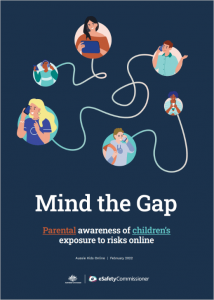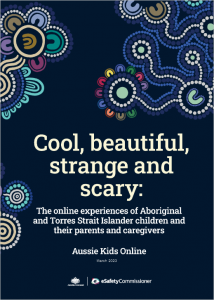The newest findings from Aussie Kids Online show that Aboriginal and Torres Strait Islander children are highly engaged in the digital environment, encouraged by their parents to take part in the online world. The internet plays a vital role in the lives of Aboriginal and Torres Strait Islander children, allowing them to make cultural and social connections, gather important information and share creative content regardless of location.
However, while the internet provides a wealth of positive experiences, Aboriginal and Torres Strait Islander children and young people are more likely to be exposed to a range of online harms, including hate speech, discrimination and bullying.
This research explores the online experiences of Aboriginal and Torres Strait Islander children and considers the digital parenting practices of their parents and caregivers. This report is the second in a series of publications that draw on the Aussie Kids Online dataset, a nationwide survey of over 3,500 young people and their parents or caregivers conducted between July and September 2021.
The first report from Aussie Kids Online – Mind the Gap: Parental Awareness of Children’s Exposure to Risks Online – showed that children experience many benefits from using the internet and those who have had negative experiences online feel empowered and knowledgeable about the actions they can take in response.
Summary of key findings
The internet is an important meeting place and platform for cultural expression for Aboriginal and Torres Strait Islander children, who are much more likely than the national average to:
- make new friends or contacts online
- post their own video or music content online
- use the internet to stay informed about the world around them, accessing news sites and regularly engaging in online discussions about social and political problems.
Negative online experiences
Aboriginal and Torres Strait Islander children are almost three times more likely than the national average to have had offensive things said to them because of their race, ethnicity, gender, nationality, sexual orientation, religion, age or disability.
These negative online experiences can have deep impacts that lead to impaired mental health, perceived reputation damage and lower grades at school.
Online safety awareness
Aboriginal and Torres Strait Islander children are proactive and knowledgeable in responding to negative experiences online, taking such steps as blocking or reporting the perpetrator and informing authorities about the incident.
Parents of Aboriginal and Torres Strait Islander children are more likely than the Australian average to instruct their child on ways to use the internet safely, regularly monitor their child’s online activities and use parental control tools such as blocking software.
Further resources
 More about the Aussie Kids Online project
More about the Aussie Kids Online project
Mind the Gap: Parental awareness of children’s exposure to risks online
Infographics – Children’s online lives: the positives and negatives
Infographics – Parental awareness of children’s exposure to risks online









